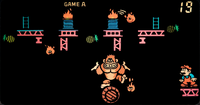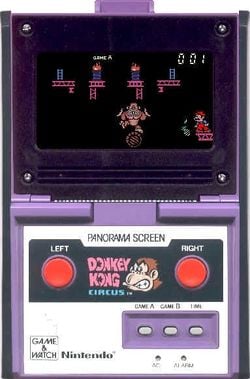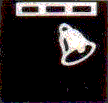Tags: Mobile edit Advanced mobile edit |
Tags: Mobile edit Advanced mobile edit |
| Line 72: |
Line 72: |
| [[Category:Donkey Kong series]] | | [[Category:Donkey Kong series]] |
| [[Category:Platforming games]] | | [[Category:Platforming games]] |
| [[Category:Reissues]] | | [[Category:Retools]] |
| [[de:Donkey Kong Circus]] | | [[de:Donkey Kong Circus]] |
| [[it:Donkey Kong Circus]] | | [[it:Donkey Kong Circus]] |
Revision as of 13:44, November 29, 2024
- Not to be confused with Circus Kong.
Donkey Kong Circus is a Game & Watch title released as part of the Panorama Screen series on September 6, 1984.[1] It is a remake of the second Mickey Mouse Game & Watch game, which was released worldwide seven months earlier. The two games' codes even seem to have gotten mixed up, with Mickey Mouse being model "DC-95" and Donkey Kong Circus being "MK-96."[1] Neither the Panorama Screen Mickey Mouse nor Donkey Kong Circus was released in Japan.
The alarm indicator of this game is a bell that is located under the time/score, and the bell swings when the alarm goes off.
Gameplay

Gameplay of
Donkey Kong CircusIn this game, Donkey Kong balances on a barrel while juggling pineapples and avoiding the fireballs falling from the drums. Mario watches his performance. Donkey Kong receives a point every time he catches a pineapple. If Donkey Kong loses a pineapple, Mario will laugh at him, resulting in a miss. If Donkey Kong manages to grasp a fireball, he will flail, which also counts as a miss. If Donkey Kong reaches 300 points without any misses, the points will be worth double until he does get a miss. If he has any misses at said score, every miss will be cleared instead. When he gets three misses, the player gets a Game Over.
Gallery
Box art for Donkey Kong Circus
Donkey Kong Circus Pineapple.jpg
Display when the game is reset
Names in other languages
| Language
|
Name
|
Meaning
|
Notes
|
Trivia
The excerpt of "Pop Goes the Weasel" on which the jingle is based
The jingle, slowed down and pitch-shifted to match the song's tempo and pitch, combined with the song itself
- This game marks Donkey Kong's first playable appearance, predating Donkey Kong Country by over a decade.
- Donkey Kong Circus used a slightly faster rearrangement of the first six seconds of "Pop Goes the Weasel" for the game start jingle.
- While this originally had a Disney license that was dropped in favor of Nintendo characters,[citation needed] the previous Game & Watch game featuring Mickey Mouse was an alternate version of Egg released simultaneously in certain countries.
- This is one of the few Game & Watch units to feature full color. This was actually due to Gunpei Yokoi's idea to move the background around the characters, rather than the other way around.
References
- ^ a b c Donkey Kong Circus. In The Attic (British English). Archived October 27, 2021, 23:07:55 UTC from the original via Wayback Machine. Retrieved June 1, 2024.
| Donkey Kong games
|
| Platformers
|
Donkey Kong series
|
Donkey Kong (1981, arcade) • Donkey Kong Jr. (1982, arcade) • Donkey Kong 3 (1983, arcade) • Donkey Kong Jr. Math (1983, NES) • Donkey Kong 3: Dai Gyakushū (1984, computer) • Donkey Kong (1994, GB)
|
| Donkey Kong Country series
|
Donkey Kong Country (1994, SNES) • Donkey Kong Country 2: Diddy's Kong Quest (1995, SNES) • Donkey Kong Country 3: Dixie Kong's Double Trouble! (1996, SNES) • Donkey Kong Country Returns (2010, Wii) • Donkey Kong Country: Tropical Freeze (2014, Wii U)
|
| Donkey Kong Land series
|
Donkey Kong Land (1995, GB) • Donkey Kong Land 2 (1996, GB) • Donkey Kong Land III (1997, GB)
|
| Mario vs. Donkey Kong series
|
Mario vs. Donkey Kong (2004, GBA) • Mario vs. Donkey Kong 2: March of the Minis (2006, DS) • Mario vs. Donkey Kong: Minis March Again! (2009, DSiWare) • Mario vs. Donkey Kong: Mini-Land Mayhem! (2010, DS) • Mario and Donkey Kong: Minis on the Move (2013, 3DS) • Mario vs. Donkey Kong: Tipping Stars (2015, 3DS/Wii U) • Mini Mario & Friends: amiibo Challenge (2016, 3DS/Wii U)
|
| DK series
|
DK: King of Swing (2005, GBA) • DK: Jungle Climber (2007, DS) (Banana Bonanza [Unknown, Adobe Flash] • Rolling Panic [Unknown, Adobe Flash] • Banana Grab [Unknown, Adobe Flash])
|
| Miscellaneous
|
Donkey Kong 64 (1999, N64) • Donkey Kong Jungle Beat (2004, GCN)
|
| Racing games
|
Diddy Kong Racing (1997, N64) • Donkey Kong Barrel Blast (2007, Wii)
|
| Donkey Konga series
|
Donkey Konga (2003, GC) • Donkey Konga 2 (2004, GC) • Donkey Konga 3 JP (2005, GC)
|
| Other
|
Donkey Kong Circus (1984, G&W) • Donkey Kong Hockey (1984, G&W) • Donkey Kong (1996, arcade) • Donkey Konk (1999, Adobe Shockwave) • Donkey Kong 64 Lore Quiz (1999, Adobe Shockwave) • Memory Kong (1999, Windows/Mac OS) • Couic d'or ! (1999, Windows/Mac OS) • Picross NP Vol. 8 (2000, SFC) • Kremling Krushin (2000, Adobe Flash) • Donkey Kong Country Barrel Maze (2003, Adobe Shockwave) • Mini-Mario Factory Game! (2004, Adobe Flash) • Hurling for Distance (2005, Adobe Flash) • Barrel-Blastapalooza (2005, Adobe Flash) • Donkey Kong: Jungle Fever (2005, arcade) • Mario vs. DK 2: Cannon Kaos (2006, Adobe Flash) • Donkey Kong: Banana Kingdom (2006, arcade) • Timber's Balloon Pop (2007, Adobe Flash) • Play Nintendo activities (2014–present)
|
| Reissues
|
Crazy Kong (1981, arcade) • Donkey Kong (1982, G&W) • Donkey Kong (1982, tabletop) • Donkey Kong Jr. (1982, G&W) • Donkey Kong II (1983, G&W) • Donkey Kong Jr. + Jr. Sansū Lesson (1983, NES) • Donkey Kong 3 (1984, G&W) • Donkey Kong Classics (1988, NES) • Donkey Kong (1994, NGW) • Donkey Kong Country Competition Cartridge (1994, SNES) • Donkey Kong Country (2000, GBC) • Donkey Kong Country (2003, GBA) • Classic NES Series: Donkey Kong (2004, GBA) • Donkey Kong Country 2 (2004, GBA) • Donkey Kong/Donkey Kong Junior/Mario Bros. (2004, arcade) • Donkey Kong Country 3 (2005, GBA) • Diddy Kong Racing DS (2007, DS) • New Play Control! Donkey Kong Jungle Beat (Wii, 2008) • Donkey Kong Original Edition (2010, VC) • Donkey Kong Country Returns 3D (2013, 3DS) • Donkey Kong Country: Tropical Freeze (2018, Switch) • Mario vs. Donkey Kong (2024, Switch) • Donkey Kong Country Returns HD (2025, Switch)
|
| Tech demos
|
Unnamed Donkey Kong Country proof-of-concept (Unknown, VB) • puzzle (Unknown, N64) • spritemonkeyEX (Unknown, N64) • Mario vs. Donkey Kong Wii U demo (2014, Wii U)
|
| Pitches / canceled games
|
Donkey Kong no Ongaku Asobi (FC) • Donkey Kong IV (arcade) • Return of Donkey Kong (NES) • Super Donkey (SNES) • CD-i Donkey Kong game (CD-i) • Donkey Kong vs. Super Wario (SNES) • Donkey Kong and the Golden Bananas (SNES) • D.K.R. DMG (GB) • Donkey Kong Coconut Crackers (GBA) • Diddy Kong Pilot (2001/2003) (GBA) • Donkey Kong Racing (GCN) • Donkey Kong Plus (GCN/GBA) • Diddy Kong Racing Adventure (GCN) • Donkey Kong Country 4 (DS) • DK Bongo Blast (GCN) • Freedom (Switch)
|
| Crossovers
|
Super Smash Bros. series
|
Super Smash Bros. (1999, N64) • Super Smash Bros. Melee (2001, GCN) • Super Smash Bros. Brawl (2008, Wii) • Super Smash Bros. for Nintendo 3DS (2014, 3DS) • Super Smash Bros. for Wii U (2014, Wii U) • Super Smash Bros. Ultimate (2018, Switch)
|
| NES Remix series
|
Main
|
NES Remix (2013, Wii U)
|
| Reissues
|
NES Remix Pack (2014, Wii U) • Ultimate NES Remix (2014, 3DS)
|
| Game & Watch games
|
| Super Mario franchise
|
Donkey Kong (1982, MS) • Mario Bros. (1983, MS) • Mario's Cement Factory (1983, TT/NWS) • Mario's Bombs Away (1983, PS) • Donkey Kong Hockey (1984, MVS) • Super Mario Bros. (1986, CrS | 1987, Sp | 1988, NWS) • Mario the Juggler (1991, NWS) • Game & Watch: Super Mario Bros. (2020, CoS)
|
| Donkey Kong franchise
|
Donkey Kong (1982, MS) • Donkey Kong Jr. (1982, NWS | 1983, TT/PS) • Donkey Kong II (1983, MS) • Donkey Kong 3 (1984, MVS) • Donkey Kong Circus (1984, PS) • Donkey Kong Hockey (1984, MVS)
|
| Miscellaneous
|
Green House (1982, MS)
|
| MS: Multi Screen • TT: Table Top • PS: Panorama Screen • NWS: New Wide Screen • MVS: Micro VS. System • CrS: Crystal Screen • Sp: Special • CoS: Color Screen
|





